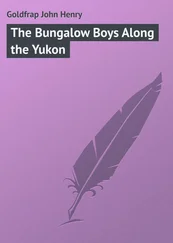William Edwards - In to the Yukon
Здесь есть возможность читать онлайн «William Edwards - In to the Yukon» — ознакомительный отрывок электронной книги совершенно бесплатно, а после прочтения отрывка купить полную версию. В некоторых случаях можно слушать аудио, скачать через торрент в формате fb2 и присутствует краткое содержание. Жанр: foreign_antique, foreign_prose, Путешествия и география, на английском языке. Описание произведения, (предисловие) а так же отзывы посетителей доступны на портале библиотеки ЛибКат.
- Название:In to the Yukon
- Автор:
- Жанр:
- Год:неизвестен
- ISBN:нет данных
- Рейтинг книги:4 / 5. Голосов: 1
-
Избранное:Добавить в избранное
- Отзывы:
-
Ваша оценка:
- 80
- 1
- 2
- 3
- 4
- 5
In to the Yukon: краткое содержание, описание и аннотация
Предлагаем к чтению аннотацию, описание, краткое содержание или предисловие (зависит от того, что написал сам автор книги «In to the Yukon»). Если вы не нашли необходимую информацию о книге — напишите в комментариях, мы постараемся отыскать её.
In to the Yukon — читать онлайн ознакомительный отрывок
Ниже представлен текст книги, разбитый по страницам. Система сохранения места последней прочитанной страницы, позволяет с удобством читать онлайн бесплатно книгу «In to the Yukon», без необходимости каждый раз заново искать на чём Вы остановились. Поставьте закладку, и сможете в любой момент перейти на страницу, на которой закончили чтение.
Интервал:
Закладка:
“The Camp,” or city, is now in the midst of a boom, and this morning we were shown several buckets of gold nuggets just brought in last night from a recent “clean up.”
When in the midst of Lake Taggish, yesterday afternoon, we were hailed by a naphtha launch of the Mounted Police, and, on our lying to, three gentlemen climbed in. One face seemed in some way familiar to me, and when I presently heard some one call him Mr. Sutton I recognized one of my old Port Hope schoolmates, who had also been at Cornell, and who had been an especial friend. He was as well pleased as I at the meeting, and is now here with me. He was a brilliant scholar, and is now British Columbia’s most eminent geologist and mining expert. We have been out together to-day, and to have his expert opinion here on what I see is invaluable. We have also met here a Mr. and Mrs. R – , of Philadelphia, to whom I had a letter, a promoter of the largest hydraulic company here, and H – has been off with Mrs. R – to-day and panned her first chunks of real, true, genuine gold, of which performance she is not a little proud. The whole country seems to be more or less full of gold; it is in the gravels and sands everywhere, and a number of very large gold-getting enterprises are under way, mostly hydraulic placer mining, but also some fine quartz veins carrying free gold are being opened up, and I have been off with Sutton all the afternoon looking at one.
September 1, 1903.We have had three days of outing; at least, I have. Saturday morning I made an early start with Sutton and three other men for a visit to some hydraulic mining operations up on Pine Creek, and to the great dredge now being built. At one of these, an operation called “The Sunrise Gold Co.,” I found in charge a Mr. Ruffner, of Cincinnati, a cousin to the Kanawha family, grandson of one of the original Ruffner brothers, who, hating slavery, had freed his slaves and removed to free soil in Ohio. A bright young fellow, managing a large operation. Then we went on further to Gold Run, where an enormous dredge is being built. An experiment in this country, about the final success of which there is yet much question. Here I dined in a tent, which is warmer, they say, than any timber building, even when the temperature is 50 degrees below zero. The valley is a broad, open one, all of glacial formation. It is very level, with Pine Creek cutting deeply between high gravel banks. A black top soil of a foot or two, eight or ten feet of grey gravel, then as much more yellowish sandy gravel, and often a foot or two of black sand at the bottom, lying upon a bed of serpentine rock; and it is in this lowest ten feet of yellow gravel and black sand that the free gold is found, nuggets of a pound or two down to minute gold dust, a red gold of about 22 to 23 carats in combination with copper or silver. Through this gravel are also immense stones and boulders, and these are the gold diggers’ particular bete noir. Most of the digging is done by getting out this gravel, freeing it of the boulders and washing it. Pine Creek is the overflow of Surprise Lake, a sheet of water twenty miles long and one-half to one mile wide; and although a considerable stream, yet its waters are so much needed in these gold-washing operations that a constant water-war among the diggers and digging companies goes on. There is much waste also in the present methods, and it is to prevent the wars as well as to save the fine gold that now largely escapes that the dredging method is to be applied. Then, too, there are only four, or at most five, months in the year when men can work, so that great energy must be expended during the open season. There is no night up here for these four months, and men work all the twenty-four hours in eight-hour shifts; thus, really, more work is done than one would at first imagine. The life of the ideally successful gold digger is to toil with unflagging vigor for the four or five months of daylight and open weather, then “come out” and blow it in leisurely luxury in some comfortable city. But not all are so able to make their summer pile. They may not strike rich pay dirt, but may find it lean, or even barren, and such must just live on through ice and snow and mighty frost, hoping for more luck another year. Many are the tales of hardship and suffering and dire wreck one hears. The little graveyard out along the Pine Creek pike has many graves in it. One man died a natural death, they say, but all the rest went to their graves stark mad from disappointment, poverty and privation. Every train passing out over the White Pass Railway carries its complement of the hopelessly insane, gone mad in the hunt for gold.
In this little town or “camp,” as it is called, are very many too poor to get away, too broken in health and spirits to more than barely exist. A delicate woman, once the wife of the mayor of an Illinois city, does our washing; her husband, a maimed and frozen cripple, sits penniless and helpless while she earns a pittance at the tub. Our landlady lets rooms to lodgers, her husband’s body lying beneath the deep waters of Teslin Lake.
A Cambridge Senior wrangler passed us yesterday on the road driving two dogs hitched to a little wagon, peddling cabbages and fish. A few strike gold, and, making their piles, depart, but the many toil hopelessly on, working for a wage, or frozen or crippled, weary in spirit and out of heart, sink into penury, or die mad.
After our dinner in the tent I joined another party, some of those interested in the building of the dredge, and drove with them twenty miles up into the interior to Otter Creek, where three of them have just started an operation, sluicing for gold. We passed many cabins and small tents, where live the men who are working claims and washing for gold. Some were quite shut down for lack of water, others were eagerly at work. At one point a Mr. S – and I left the wagon and struck six miles across a great grassy mountain. We must have ascended 2,000 feet or more. An easy ascent over a vast expanse of moss and tufted grass; no trees, no bushes, no hardy herbs, nothing but grass and moss. Only on the south and west was the horizon bounded by jagged peaks and summits of snow-topped mountains. Glacial action has everywhere worn down the surface into rounded rolling domes and slopes, and for hundreds of miles the land is one wide moorland of grass and moss.
Here are many flocks of wild sheep and mountain goats, and here moose and caribou are said to abound. During the day, about the noon hour, a giant bull moose had stalked deliberately through the midst of the camp, neither quickening his pace, nor fearing man. So engrossed were the men in their search for gold, that none dropped pick or shovel to molest him.
On these higher slopes are multitudes of ptarmigan, – the birds breeding close to the permanent snow line, remaining high up during the summer heats, and gradually descending to the valleys as the fresh falling autumnal snows little by little push them down.
In Atlin, the other day, a young Swedish engineer, a graduate of Upsala, showed me a fine pair of ibex horns from one which he had shot high up on the mountains beyond the lake. The animal, though not uncommon, is difficult to get, inhabiting the most inaccessible summits and rarely descending to even the levels where the mountain sheep and goats find pasture.
A superb and seemingly boundless pasture land where great herds of cattle ought also to be feeding, and would be, except for the terror of the winter’s cold. Perhaps the reindeer will some day here find a congenial home.
We sat by fires after nightfall, and when day came icicles a foot long hung all along the drip of the flume, and in the afternoon snow fell, covering every rounded summit with its white mantle.
Returning, I walked another ten miles down the winding valley of Otter Creek. A stretch of open, grassy moorland, where in the winter-time the moose and caribou gather in numbers seeking shelter from the winds, and finding the dried grass through the scraped-off snow.
Читать дальшеИнтервал:
Закладка:
Похожие книги на «In to the Yukon»
Представляем Вашему вниманию похожие книги на «In to the Yukon» списком для выбора. Мы отобрали схожую по названию и смыслу литературу в надежде предоставить читателям больше вариантов отыскать новые, интересные, ещё непрочитанные произведения.
Обсуждение, отзывы о книге «In to the Yukon» и просто собственные мнения читателей. Оставьте ваши комментарии, напишите, что Вы думаете о произведении, его смысле или главных героях. Укажите что конкретно понравилось, а что нет, и почему Вы так считаете.












